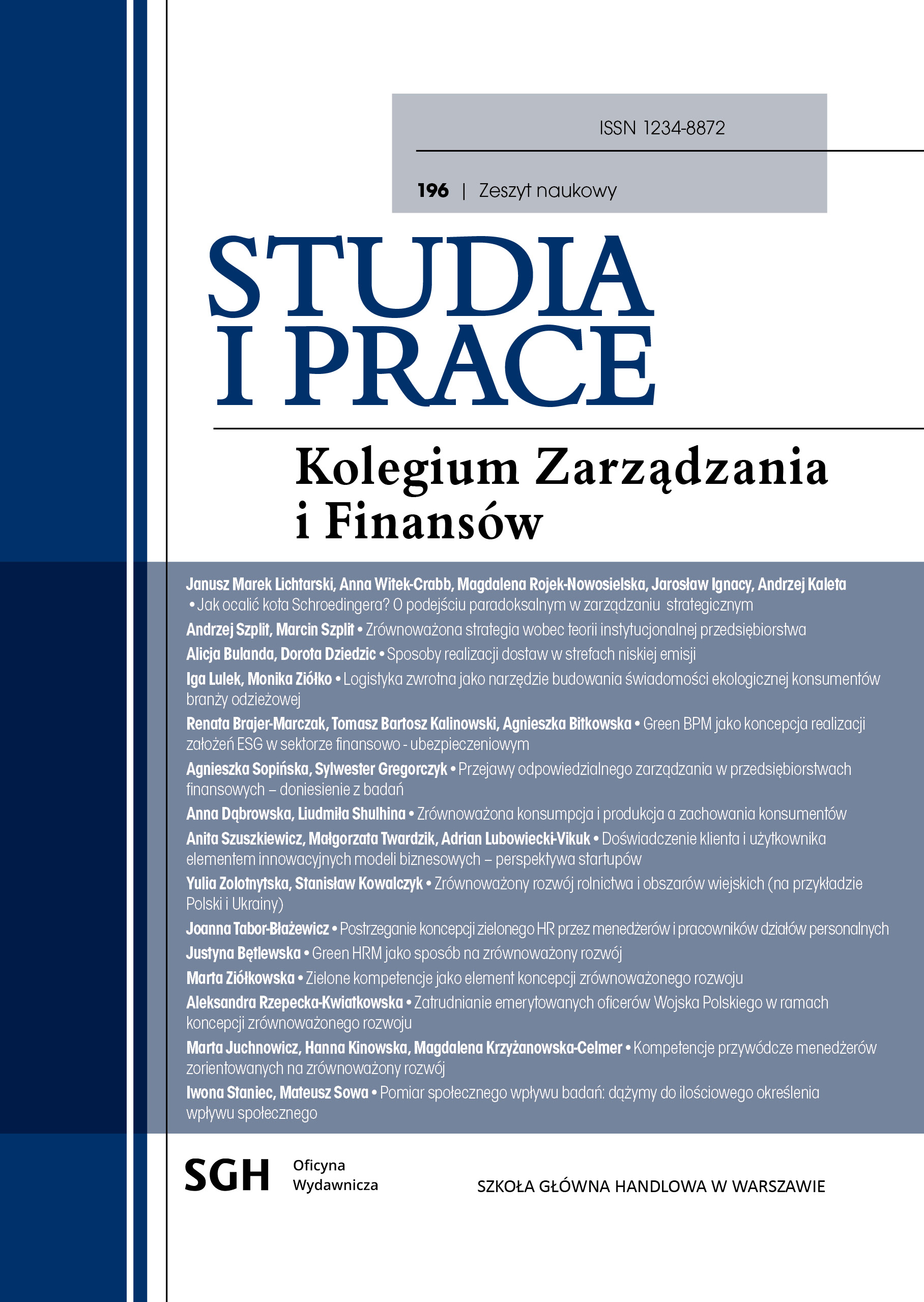How to save Schroedinger’s Cat? On the paradoxical approach to strategic management
DOI:
https://doi.org/10.33119/SIP.2024.196.1Keywords:
strategic management, dilemmas, environmental uncertaintyAbstract
The aim of the study is to identify strategists’ approaches to paradoxes associated with strategic management in organizations under conditions of increased uncertainty. In pursuit of this goal, it is crucial to both identify strategists’ opinions on paradoxes and explore their experiences in applying them in the practice of strategic management. The research was conducted using a qualitative approach, employing in-depth interviews with strategists (n = 18). The research findings indicate that, in conditions of heightened uncertainty, strategists employ solutions and practices characteristic of a paradoxical approach. This reflects a significant shift in the application of paradoxical perspectives under conditions of high environmental uncertainty, triggered by the COVID-19 pandemic and its consequences.
Downloads
References
Wydawnictwa zwarte
Creswell, J. (2014). Research design: Qualitative, Quantitative, and Mixed Methods Approaches. Thousand Oaks: Sage Publications.
Cyert, R., March, J. (1963). A Behavioral Theory of the Firm. New York: Prentice-Hall. 3. Eriksson, P., Kovalainen, A. (2016). Qualitative Methods in Business Research (2nd edition). London: Sage.
Gerring, J. (2007). Case Study Research. Principles and Practices. New York: Cambridge University Press. 5. Krupski, R. (red.). (2005). Zarządzanie przedsiębiorstwem w turbulentnym otoczeniu. Ku superelastycznej organizacji. Warszawa: Polskie Wydawnictwo Ekonomiczne.
Luo, Y. (2004). Coopetition in International Business. Copenhagen: Copenhagen Business School Press.
de Wit, B., Meyer, R. (2007). Synteza strategii. Tworzenie przewagi konkurencyjnej poprzez analizowanie paradoksów. Warszawa: Polskie Wydawnictwo Ekonomiczne.
Artykuły naukowe
Bengtsson, M., Kock, S. (2000). “Coopetition” in Business Networks – to Cooperate and Compete Simultaneously, Industrial Marketing Management, 29 (5), s. 411–426.
Bengtsson, M., Kock, S. (2014). Coopetition – Quo vadis? Past Accomplishments and Future Challenges, Industrial Marketing Management, 43 (2), s. 180–188.
Benner, M. J., Tushman, M. L. (2003). Exploitation, Exploration, and Process Management: The Productivity Dilemma Revisited, Academy of Management Review, 28 (2), s. 238–256.
Bonn, I. (2005). Improving Strategic Thinking: a Multilevel Approach, Leadership and Organization Development Journal, 26 (5), s. 336–354.
Das, K., Teng, B. S. (2000). Instabilities of Strategic Alliances: An Internal Tensions Perspective, Organization Science, 11 (1), s. 77–101.
Eisenhardt, K. M., Martin, J. A. (2000). Dynamic Capabilities: What Are They?, Strategic Management Journal, 21 (10/11), s. 1105–1121.
Friedman, M. (1970). The Social Responsibility of Business is to Increase Its Increase Its Profits, New York Times Magazine, September 13, s. 17. 22 Janusz Marek Lichtarski, Anna Witek-Crabb, Magdalena Rojek-Nowosielska, Jarosław Ignacy…
Griffin, M., King, D. R., Reedy, P. (2021). Learning to “Live the Paradox” in a Democratic Organization: A Deliberative Approach to Paradox Mindsets, Academy of Management Learning & Education, 21 (4), s. 624–647.
Hart, S. L. (1992). An Integrative Framework for Strategy-Making Processes, The Academy of Management Review, 17 (2), s. 327–351.
Hitt, M. A., Ireland, R. D., Sirmon, D. G., Trahms, C. A. (2011). Strategic Entrepreneurship: Creating Value for Individuals, Organizations, and Society, Academy of Management Perspectives, 25 (2), s. 57–75.
Jensen, M. C. (2002). Value Maximization, Stakeholder Theory, and the Corporate Objective Function, Business Ethics Quarterly, 12 (2), s. 235–256.
Kaleta, A., Witek-Crabb, A., Lichtarski, J. M., Ignacy, J., Rojek-Nowosielska, M., Sołoducho--Pelc, L. (2022). Perspektywa paradoksów w zarządzaniu strategicznym, Przegląd Organizacji, 2, s. 11–20.
Karhu, P., Ritala, P. (2020). The Multiple Faces of Tension: Dualities in Decision-making, Review of Managerial Science, 14 (3), s. 485–518.
Lewis, M. W. (2000). Exploring Paradox: Toward a More Comprehensive Guide, Academy of Management Review, 25 (4), s. 760–776.
Luoma, J., Martela, F. (2021). A Dual-processing View of Three Cognitive Strategies in Strategic Decision Making: Intuition, Analytic Reasoning, and Reframing, Long Range Planning, 54 (3), s. 1–15.
March, J. G. (1991). Exploration and Exploitation in Organizational Learning, Organization Science, 2 (1), s. 71–87.
Mintzberg, H., Waters, J. A. (1985). Of Strategies, Deliberate and Emergent, Strategic Management Journal, 6 (3), s. 257–272.
Poole, M. S., Van de Ven, A. (1989). Using Paradox to Build Management and Organizational theory, Academy of Management Review, 14 (4), s. 562–578.
Putnam, L. L., Fairhurst, G. T., Banghart, S. (2016). Contradictions, Dialectics, and Paradoxes in Organizations: A Constitutive Approach, Academy of Management Annals, 10 (1), s. 65–171.
Schad, J., Lewis, M. W., Raisch, S., Smith, W. K. (2016). Paradox Research in Management Science: Looking Back to Move Forward, Academy of Management Annals, 10 (1), s. 5–64.
Slawinski, N., Bansal, P. (2015). Short on Time: Intertemporal Tensions in Business Sustainability, Organization Science, 26 (2), s. 531–549.
Smith, W. K., Lewis, M. W. (2011). Toward a Theory of Paradox: A Dynamic Equilibrium Model of Organizing, Academy of Management Review, 36 (2), s. 381–403.
Tushman, M. L., O’Reilly III, C. A. (1996). Ambidextrous Organizations: Managing Evolutionary and Revolutionary Change, California Management Review, 38 (4), s. 8–29.
Wood, D., LaForge, R. (1979). The Impact of Comprehensive Planning on Financial Performance, Academy of Management Journal, 22 (3), s. 516–526.
Zaheer, A., Gözübüyük, R., Milanov, H. (2010). It’s the Connections: The Network Perspective in Interorganizational Research, Academy of Management Perspectives, 24 (1), s. 62–77.
Zakrzewska-Bielawska, A. (2016). Paradoks eksploracji i eksploatacji – ambidexterity w zarządzaniu strategicznym, Prace Naukowe Uniwersytetu Ekonomicznego we Wrocławiu, 420, s. 435–449.
Downloads
Published
How to Cite
Issue
Section
License
Copyright (c) 2024 Studies and Work of the Collegium of Management and Finance

This work is licensed under a Creative Commons Attribution 4.0 International License.









